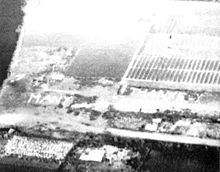- Operations Manna and Chowhound
-
Operations Manna and Chowhound took place from 29 April to the end of World War II in Europe on 8 May 1945. These two operations—Manna by the Royal Air Force (29 April – 7 May) and Chowhound by the U.S. Air Force (1–8 May)—dropped a total of 11,000 tons of food into the still-unliberated western part of the Netherlands, with the acquiescence of the occupying German forces, to help feed civilians who were in danger of starvation in the Dutch famine. When this proved insufficient, Operation Faust was launched as well. On 2 May, 200 Allied trucks began delivering food to the city of Rhenen, behind German lines.
Contents
Negotiations
By early 1945, the situation was growing desperate for the three million or more Dutch still under German control. Prince Bernhard appealed directly to Allied Supreme Commander Dwight D. Eisenhower, but Eisenhower did not have the authority to negotiate a truce with the Germans. While the prince got permission from Prime Minister Winston Churchill and President Franklin D. Roosevelt, Eisenhower had Air Commodore Andrew Geddes begin planning immediately. On 23 April, authorization was given by the Chief of Staff, George Marshall.
Allied agents negotiated with Reichskommissar Arthur Seyss-Inquart and a team of German officers. Among the participants were the future Canadian writer Farley Mowat and the German commander-in-chief, General Blaskowitz. It was agreed that the participating airplanes would not be fired upon within specified air corridors.
Operation Manna
The British operation started first. It was named after the food which was miraculously provided to the Israelites in the Book of Exodus. The planning of the whole operation was done first by the Royal Air Force.[1]
The first of the two RAF Avro Lancasters chosen for the test flight, the morning of April 29, 1945, was nicknamed "Bad Penny," as in the expression: "a bad penny always comes back". This bomber, with a crew of seven young men (five from Ontario, Canada, including pilot Robert Upcott of Windsor, Ontario), took off in bad weather despite the fact that the Germans had not yet agreed to the ceasefire agreement. (Seyss-Inquart would do so the next day.) Bad Penny had to fly low, down to 50 feet (15 m), over German guns, but succeeded in dropping her precious cargo and returned to base.
Operation Manna then began in earnest.[2] British aircraft from Groups 1, 3, and 8, consisting of 145 Mosquitoes and 3,156 Lancaster bombers, took part, flying between them a total of 3,298 sorties. These bombers were used to dropping bombs from 6,000 metres (20,000 ft), but this time they had to do their job from a height of 150 metres (490 ft), some even flying as low as 120 metres (390 ft), as the cargo did not have parachutes. The drop zones, marked by Mosquitoes from Squadrons 105 and 109 using Oboe, were: Leiden (Valkenburg airfield), The Hague (Duindigt horse race course and Ypenburg airfield), Rotterdam (Waalhaven airfield and Kralingsche Plas) and Gouda. Bomber Command delivered a total 6,680 tons of food.
The idea was for people to gather and redistribute the food, but some could not resist eating straight away, which caused some people to get sick and vomit, a result that fatty food can have in starved bodies. On the other hand, distribution sometimes took as long as ten days, resulting in some getting the food only after the liberation. Nevertheless, many lives were saved, and it gave hope and the feeling that the war would soon be over.
Earlier, there had been a distribution of white bread made from Swedish flour that was shipped in and baked locally. A popular myth holds that this bread was dropped from airplanes, but that is a mix-up between the two events. Also, the food was not dropped with parachutes, as is often said.
Operation Chowhound
On the American side, ten bomb groups of the US Third Air Division flew 2268 sorties beginning 1 May,[1] delivering a total of 4000 tons.[3] 400 B-17 Flying Fortress bombers of the United States Army Air Forces dropped 800 tons of K-rations during May 1–3, on Amsterdam Schiphol Airport.
Losses
Three aircraft were lost: two in a collision and one due to engine fire.[4]
Recognition
On 28 April 2007, British Air Commodore Andrew Geddes was honored when a hiking trail in the Rotterdam district of Terbregge, the Air Commodore Geddespath, was named after him. This path goes past the Manna/Chowhound monument in the soundwall of the northern ringroad around Rotterdam. The official unveiling of the plaque was performed by Lieutenant-Commander Angus Geddes RN (son of Andrew Geddes) from England and Warrant Officer David Chiverton from Australia (grandson of Geddes).
References
Notes
- ^ a b Hawkins 1995, p. 277.
- ^ A Bad Penny Always Comes Back
- ^ Manna From Heaven- Legion Magazine, May 1, 2005, by Ted Barris
- ^ Vos MacDonald 2002, p. 54.
Bibliography
- uncredited. "They Fell Right In The Larder" Aeroplane Monthly, May 1985.
- Hawkins, Ian. B-17s over Berlin: Personal Stories from the 95th Bomb Group (H). Washington, DC: Brassey's, Inc., 1995. ISBN 0-02-881129-1.
- Onderwater, Hans. Operatie "Manna": De Gealieerde Voedseldroppings April/Mei 1945 (in Dutch). Weesp, Netherlands: Romen Luchtvaart, 1985. ISBN 90-228-3776-9.
- Ridder, Willem. Countdown To Freedom. Authorhouse, 2007. ISBN 1-4343-1229-1.
- Vos MacDonald, Joan. Our Mornings May Never Be. General Store Publishing House, 2002. ISBN 1-894263-73-1.
External links
Categories:- World War II Western European Theatre
- Famines
- 1945 in the Netherlands
- Humanitarian military operations
- Netherlands in World War II
- History of the Royal Air Force during World War II
- Airlifts
- Aerial operations and battles of World War II involving the United Kingdom
Wikimedia Foundation. 2010.

